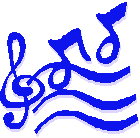
|
Oratorio
"Oratorio" derives its name
from the oratory (a chapel in the church) in which a monk Fillipo Neri,
used to deliver his sermons on Biblical history during the Sixteenth Century.
Sacred songs illustrated these discourses. The modern oratorio consists
of solos, duets, broad majestic choruses and recitatives with full orchestral
accompaniment. It is distinguished from opera by the absence of action,
costumes, and scenery. Usually the story is based on some text from the
Bible. In the 18th Century, Bach, Handel and Haydn developed the
oratorio to its highest standard.
"The Messiah" was written
by George Friedric Handel, a German composer, who spent many years in England
and who lies buried in Westminster Abbey.
Franz Joseph Haydn was born
in Rohrau, Austria, in 1732. His genius attracted attention when he was
very young and he is often called the father of instrumental music. In
his early thirties, he enjoyed the patronage and friendship of the wealthy
Prince Esterhazy and in consequence, spent much time in Hungary. While
there, he developed a keen interest in the music of the Hungarian gypsies.
The composition below is an air from the last movement of Haydn's trio
for piano, violin and 'cello, very properly called the "Gypsy Rondo". This
music is characteristic of the Gypsy folk, full of light and the joy of
living. All of Haydn's work is characterised by simplicity, perfect finish,
and the avoidance of meaningless phrases.
|
Anca Titu
"D. Zamfirescu" School,
Focsani, Romania
Teacher Petru
Dumitru
|
|